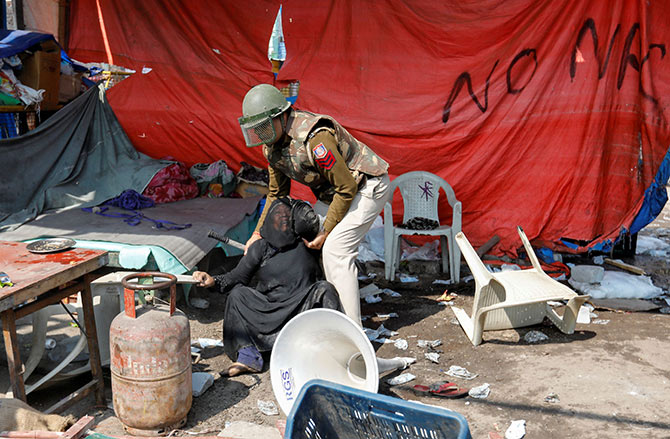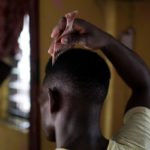‘The most important thing is that medical aid reaches people whenever required.’
IMAGE: A woman opposing the new citizenship law is assisted by a policeman after she was beaten by people supporting the law at a protest site in New Delhi. Photograph: Danish Siddiqui/Reuters
In the wee hours of Wednesday, February 26, the Delhi high court directed the police to immediately escort some 20 individuals injured in the ongoing riots in Mustafabad, north east Delhi, to the Guru Tegh Bahadur hospital for treatment.
Justice S Muralidhar and Justice Anup J Bhambhani convened at Justice Muralidhar’s residence around 12.30 am on Wednesday to hear the plea filed by Advocate Suroor Mander.
Mander explained the dire circumstances of victims trapped at the Al Hind hospital to Justice Muralidhar over the telephone.
She also arranged for Dr Anwar at the Al Hind hospital to speak to the judges via speaker mode. Dr Anwar explained there were two dead individuals and around 22 injured persons at the Al Hind hospital and that he had been trying to seek police help from around 4 pm on February 25 without success.
Speaking to Syed Firdaus Ashraf/KhabriBaba.com, Mander says, “The police has no excuse for what they have done.”
Why did you approach the Delhi high court in the middle of the night?
We were getting calls from desperate people at the Al Hind hospital in Mustabfabad. It is in the heart of the current riots taking place and a lot of injured people have been taken there. Over time, the number of injured taken to the hospital were too many.
Despite repeated requests, we were not allowed to open the police barricades and allow the passage of ambulances.
In our time of desperation, we approached the high court and the bench of Justices S Muralidhar and Anup J Bhambhani passed the order directing the cops to ensure safe passage of the injured.
We also requested the setting up of a help desk to which the court said they would meet us at 2.15 pm today.
How serious is the situation in Delhi as of now?
It is very serious as ambulances can’t move in that area.
Misinformation is being spread and violence is spreading.
The police is not allowing access to ambulances, either private or government, and therefore the situation has become very difficult for residents of Mustafabad.
What is the reason for the police not allowing ambulances?
The police says they have not been able to secure safe passage. But that is nonsensical as there are people who are injured.
The police is not allowing ambulances as they feel the ambulances will be used by rioters to move around.
Private ambulances could be a problem, but they should have still allowed public ambulances.
The police has no excuse for what they have done.
What are the human rights violations that are taking place?
The Delhi police has been extremely high-handed in its response.
Apart from stories and videos, actual accounts of their partisan behaviour is also in the open.
There is a serious issue of high-handedness. We have called and called the police for assistance, but did not get any response.
Till the time we approached the court we did not get anything that was favourable. Now the communication lines have opened and it is too little too late.
What do you want from the court, if according to you, it is already a little too late?
The court has to ensure that we protect the rights of the most marginalised, especially people in distress like women and children.
The most important thing is that medical aid reaches people whenever required and the police takes it on priority.
Can you tell us the geography of that area? Why has it become so volatile all of a sudden?
It is the poorer part of Delhi city. It is largely made up of migrants who have come from other parts of the country and are settled there. They do low income jobs. There are a lot of small-income traders from the (Muslim and Hindu) communities.
There are pockets where one religious group is in the majority. Then there is the mixed population. It is basically all bordering Uttar Pradesh, Loni and Ghaziabad areas. It is north east Delhi.




